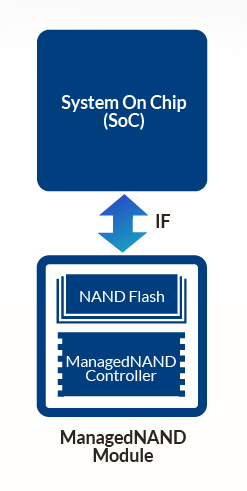HMT’s technologies include embedded ManagedNAND module and removable memory card capabilities.
e•MMC
The industry standard embedded mobile storage memory which integrates flash memory control and non-volatile memory into one package.
SD
The industry standard for removable memory in smart phones, tablets, digital cameras and GPS devices.
UFS
The next generation storage memory solution and an emerging standard that offers Gb level bandwidth for applications requiring high transfer rates.

ManagedNAND Module
Includes typically a memory controller and NAND memory chip(s) in a stacked multichip module. In high performance memory modules there may also be DRAM or an emerging non-volatile technology (like MRAM) cache memory included. These modules come in different form factors and different dimensions. Several different standards and de facto implementations apply, such as JEDEC® e•MMC and UFS, Secure Digital (SD/microSD), SSD, and USB sticks.
- Solid State Mass Memory Element (NAND Flash) NAND is presently the most commonly used memory technology. NAND comes in different forms, such as SLC (single level cell), MLC (multi-level cell), 3-4bit per cell and 3D-NAND. Different technology variations are used for a broad array of optimizations and applications. Typically several NAND dies are stacked inside the module to achieve higher capacities and performance.
- ManagedNAND Controller The memory controller has several tasks: it manages the interface and command protocol, takes care of the flash management (including bad block management and wear leveling), implements the error correction circuitry (EDC/ECC), performs security-related functions and typically takes care of the power management of the module. The controller includes some SRAM memory for executing its operating code (known as firmware, FW) and for buffering of data.
- Interface (IF) Several different interface and protocol standards are utilized by different managedNAND devices including: e•MMC, MIPI® M-PHY® and UniPro® (by UFS), Secure Digital i.e. SD, SCSI, SATA, SAS, PCIe, NVMe, etc.
